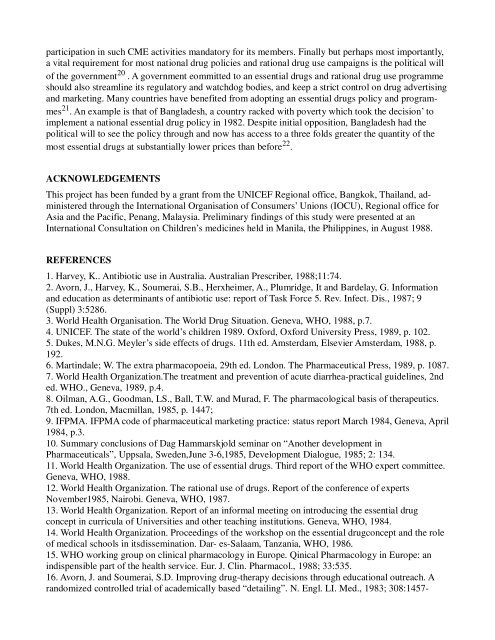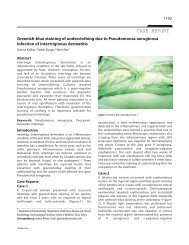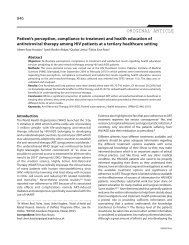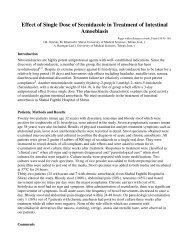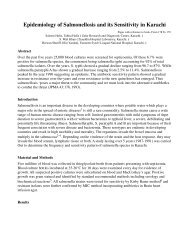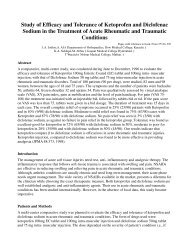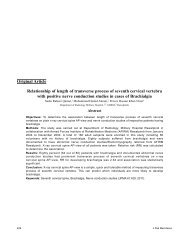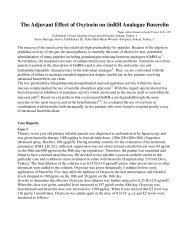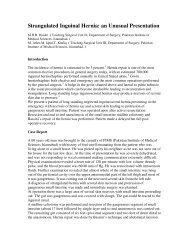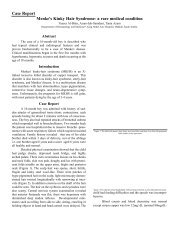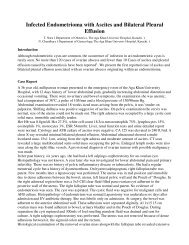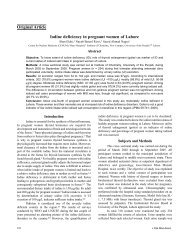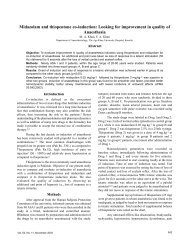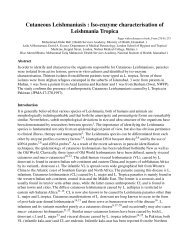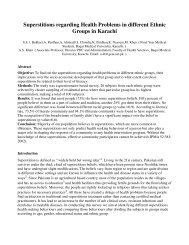a survey of paediatric prescribing and dispensing in karachi
a survey of paediatric prescribing and dispensing in karachi
a survey of paediatric prescribing and dispensing in karachi
Create successful ePaper yourself
Turn your PDF publications into a flip-book with our unique Google optimized e-Paper software.
participation <strong>in</strong> such CME activities m<strong>and</strong>atory for its members. F<strong>in</strong>ally but perhaps most importantly,<br />
a vital requirement for most national drug policies <strong>and</strong> rational drug use campaigns is the political will<br />
<strong>of</strong> the government 20 . A government eommitted to an essential drugs <strong>and</strong> rational drug use programme<br />
should also streaml<strong>in</strong>e its regulatory <strong>and</strong> watchdog bodies, <strong>and</strong> keep a strict control on drug advertis<strong>in</strong>g<br />
<strong>and</strong> market<strong>in</strong>g. Many countries have benefited from adopt<strong>in</strong>g an essential drugs policy <strong>and</strong> programmes<br />
21 . An example is that <strong>of</strong> Bangladesh, a country racked with poverty which took the decision’ to<br />
implement a national essential drug policy <strong>in</strong> 1982. Despite <strong>in</strong>itial opposition, Bangladesh had the<br />
political will to see the policy through <strong>and</strong> now has access to a three folds greater the quantity <strong>of</strong> the<br />
most essential drugs at substantially lower prices than before 22 .<br />
ACKNOWLEDGEMENTS<br />
This project has been funded by a grant from the UNICEF Regional <strong>of</strong>fice, Bangkok, Thail<strong>and</strong>, adm<strong>in</strong>istered<br />
through the International Organisation <strong>of</strong> Consumers’ Unions (IOCU), Regional <strong>of</strong>fice for<br />
Asia <strong>and</strong> the Pacific, Penang, Malaysia. Prelim<strong>in</strong>ary f<strong>in</strong>d<strong>in</strong>gs <strong>of</strong> this study were presented at an<br />
International Consultation on Children’s medic<strong>in</strong>es held <strong>in</strong> Manila, the Philipp<strong>in</strong>es, <strong>in</strong> August 1988.<br />
REFERENCES<br />
1. Harvey, K.. Antibiotic use <strong>in</strong> Australia. Australian Prescriber, 1988;11:74.<br />
2. Avorn, J., Harvey, K., Soumerai, S.B., Herxheimer, A., Plumridge, It <strong>and</strong> Bardelay, G. Information<br />
<strong>and</strong> education as determ<strong>in</strong>ants <strong>of</strong> antibiotic use: report <strong>of</strong> Task Force 5. Rev. Infect. Dis., 1987; 9<br />
(Suppl) 3:5286.<br />
3. World Health Organisation. The World Drug Situation. Geneva, WHO, 1988, p.7.<br />
4. UNICEF. The state <strong>of</strong> the world’s children 1989. Oxford, Oxford University Press, 1989, p. 102.<br />
5. Dukes, M.N.G. Meyler’s side effects <strong>of</strong> drugs. 11th ed. Amsterdam, Elsevier Amsterdam, 1988, p.<br />
192.<br />
6. Mart<strong>in</strong>dale; W. The extra pharmacopoeia, 29th ed. London. The Pharmaceutical Press, 1989, p. 1087.<br />
7. World Health Organization.The treatment <strong>and</strong> prevention <strong>of</strong> acute diarrhea-practical guidel<strong>in</strong>es, 2nd<br />
ed. WHO., Geneva, 1989, p.4.<br />
8. Oilman, A.G., Goodman, LS., Ball, T.W. <strong>and</strong> Murad, F. The pharmacological basis <strong>of</strong> therapeutics.<br />
7th ed. London, Macmillan, 1985, p. 1447;<br />
9. IFPMA. IFPMA code <strong>of</strong> pharmaceutical market<strong>in</strong>g practice: status report March 1984, Geneva, April<br />
1984, p.3.<br />
10. Summary conclusions <strong>of</strong> Dag Hammarskjold sem<strong>in</strong>ar on “Another development <strong>in</strong><br />
Pharmaceuticals”, Uppsala, Sweden,June 3-6,1985, Development Dialogue, 1985; 2: 134.<br />
11. World Health Organization. The use <strong>of</strong> essential drugs. Third report <strong>of</strong> the WHO expert committee.<br />
Geneva, WHO, 1988.<br />
12. World Health Organization. The rational use <strong>of</strong> drugs. Report <strong>of</strong> the conference <strong>of</strong> experts<br />
November1985, Nairobi. Geneva, WHO, 1987.<br />
13. World Health Organization. Report <strong>of</strong> an <strong>in</strong>formal meet<strong>in</strong>g on <strong>in</strong>troduc<strong>in</strong>g the essential drug<br />
concept <strong>in</strong> curricula <strong>of</strong> Universities <strong>and</strong> other teach<strong>in</strong>g <strong>in</strong>stitutions. Geneva, WHO, 1984.<br />
14. World Health Organization. Proceed<strong>in</strong>gs <strong>of</strong> the workshop on the essential drugconcept <strong>and</strong> the role<br />
<strong>of</strong> medical schools <strong>in</strong> itsdissem<strong>in</strong>ation. Dar- es-Salaam, Tanzania, WHO, 1986.<br />
15. WHO work<strong>in</strong>g group on cl<strong>in</strong>ical pharmacology <strong>in</strong> Europe. Q<strong>in</strong>ical Pharmacology <strong>in</strong> Europe: an<br />
<strong>in</strong>dispensible part <strong>of</strong> the health service. Eur. J. Cl<strong>in</strong>. Pharmacol., 1988; 33:535.<br />
16. Avorn, J. <strong>and</strong> Soumerai, S.D. Improv<strong>in</strong>g drug-therapy decisions through educational outreach. A<br />
r<strong>and</strong>omized controlled trial <strong>of</strong> academically based “detail<strong>in</strong>g”. N. Engl. LI. Med., 1983; 308:1457-


